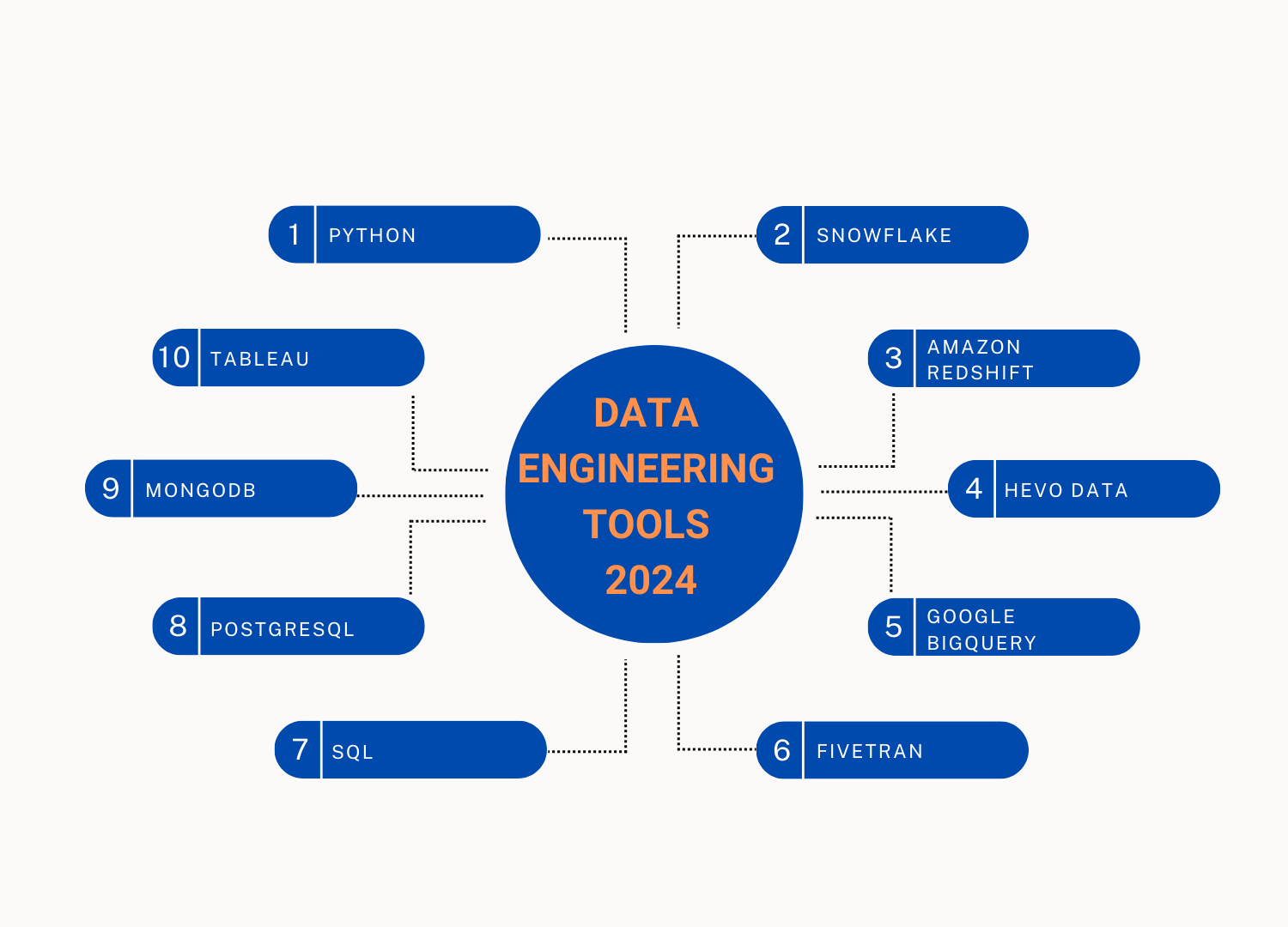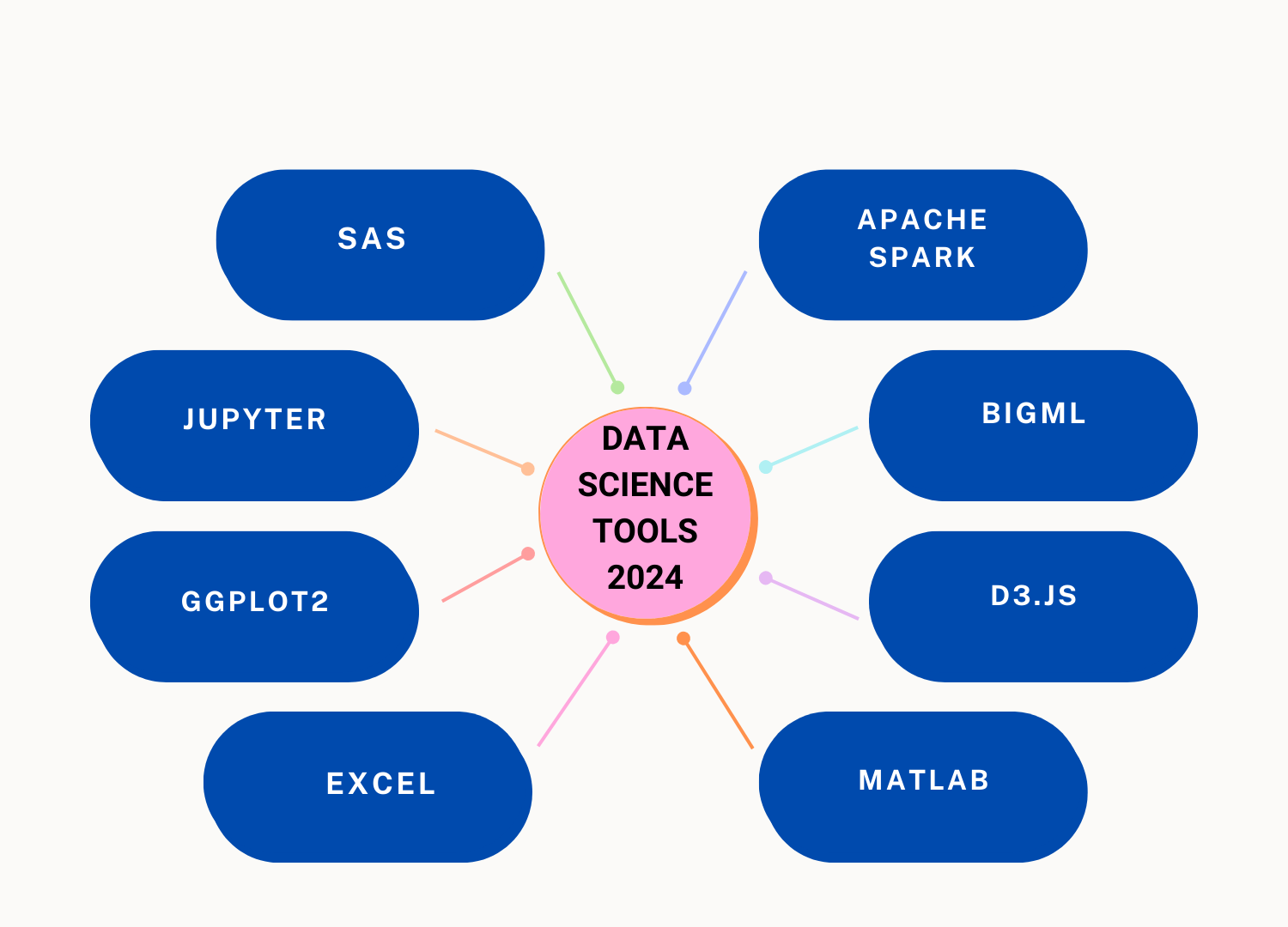Data science and data engineering roles have become distinct but also interconnected in the rapidly changing data-driven businesses. Although managing and extracting value from data is a critical function of both professions, there are typical differences in their responsibilities, skill sets, and goals. A few years ago, extracting insights from data was the main priority. However, as the sector developed, the importance of sound data management became increasingly apparent. This change in viewpoint has highlighted the symbiotic relationship between data engineers and data scientists. However, the question remains – Data science vs data engineering, which one to choose?
The Bureau of Labor Statistics projects a 35% increase in job growth in the field of data science from 2020 to 2030, which is significantly greater than the average growth of other occupations. The discipline has seen increasing demand in recent years. There is no indication that the demand for big data analytics, which businesses rely on to run their operations, will decrease.
The Rise of Data
Let’s delve deeper into the specifics of Data science vs. data engineering. But initially let’s discuss why they are important in today’s digital environment. Management of the large amount of data that is generated every day is important. The main reason for this is the widespread use of phones, the internet, and IoT devices. Data contains insightful information that has the potential to change industries. It can advance healthcare, reduce energy use, and improve almost every element of our lives.
But raw data is like a treasure chest hidden in the sand; only experts who know how to gather, handle, examine, and extract useful insights from it can truly uncover its value. Data engineers and scientists can help in this situation.
Find out how our data engineering solutions can help you create a highly effective data team that meets your needs.
What is Data Science?
Data science is the process of working with massive amounts of data and applying contemporary tools and techniques to change invisible patterns, extract useful information, and improve decision-making.
Complex artificial intelligence solutions are used in data science to build predictive models. The data analysis may be supplied in a variety of formats. It originates from a wide range of various sources.
What does a data scientist do?
A data scientist employs various methods, tools, and technological advancements. They select the optimal combinations for quicker and more accurate outcomes based on the problem. The daily responsibilities and role of a data scientist vary based on the organization’s size and needs. The specifics could differ, even though they usually adhere to the data science procedure. A data scientist works with analysts, engineers, machine learning specialists, and statisticians in bigger data science teams. This is to guarantee that the data science process is followed precisely and that business objectives are met.
On the other hand, a data scientist may take on multiple roles in smaller teams. Owing to their training, background, and experience, they might play several different or overlapping roles. In this scenario, in addition to fundamental data science services, their everyday tasks may involve data engineering analytics and machine learning.
Data Engineering: What Is It?
So, what is data engineering? It is a branch that focuses on creating and constructing frameworks that enable users to use various tools to gather and analyze raw data from various sources and formats. These tools support the system architecture’s development, testing, and design. Businesses can use it to handle and process massive amounts of data.
What does a Data Engineer do?
Building, maintaining, and keeping an eye on data pipelines and storage systems is the major objective of data engineers. To put a data engineer’s work into perspective, just picture creating a user profile on a website. The process of entering your details on the website serves as the “capture point” for information such as your phone number, email address, and name. Digital transformation solutions create a pipeline to transfer the data from the collection point to a storage location, like a data warehouse or data lake, because the data needs to be kept somewhere.
There will be a lot of data in storage if the website is busy. Sorting it is necessary to make it easier for others to search through and identify information, including data scientists and analysts. Thus, data engineers also create pipelines that move data through the system and transform unstructured, raw data into details that can be used. Data engineers keep a close eye on everything to make sure it functions as it should. Whereas, data scientists subsequently use the data.

Data Science Vs. Data Engineering: Which is The Best?
| Aspect | Data Engineering | Data Science |
|---|---|---|
| Primary Focus | Building and maintaining data pipelines and infrastructure | Analyzing and interpreting data to extract insights |
| Role Objective | Ensuring data is collected, stored, and processed efficiently | Leveraging data to make data-driven business decisions |
| Skills Required | Database management, ETL (Extract, Transform, Load) | Statistics, Machine Learning, Data Visualization |
| Tools and Tech | Hadoop, Spark, SQL, and NoSQL databases | Python, R, SQL, TensorFlow, Pandas |
| Data Manipulation | Emphasizes efficient data processing and storage | Focuses on data analysis, modeling, and visualization |
| Output | Structured, clean, and accessible data | Valuable insights, predictions, and actionable outcomes |
| Key Responsibilities | Designing data architectures, data integration, data warehousing | Exploratory data analysis, predictive modeling, data visualization |
| Industry Application | Data infrastructure, data pipelines, big data solutions | Business intelligence, predictive analytics, data-driven decision-making |
| Collaboration | Collaborates closely with Data Scientists for data accessibility and quality | Collaborates with Data Engineers for data access and pipeline optimization |
| Goal | Sets the foundation for effective data analysis | Applies analysis to drive data-based decision-making |
Responsibilities of Data Engineers
An individual who designs, builds, tests, and maintains architectures—such as databases and large-scale processing systems—is known as a data engineer. Conversely, a data scientist is a person who cleans, manipulates, and arranges (big) data.
The verb “massage” was chosen, which may seem particularly unusual to you, but it only highlights the further distinction when it comes to Data science vs. data engineering.
In general, there will be significant differences in the amount of work required from both sides to get the data in a format that can be used.
Data engineers work with unprocessed data that may involve errors from instruments, machines, or people. The data will be unformatted and may contain system-specific codes; it may also contain unverified records.
Top Data engineering companies will have to suggest—and occasionally put into practice—methods to raise the quality, efficiency, and dependability of data. To accomplish this, they will need to use a range of languages and tools to integrate systems or look for ways to obtain fresh data from other systems so that, for example, system-specific codes can be transformed into information for data scientists to process further.
The need for data engineers to make sure that the architecture in place satisfies the needs of data scientists and stakeholders, the business, is tightly tied to these two. Finally, the data engineering team will need to create data set processes for data modeling, mining, and production to give the data to the data science team.
Responsibilities of Data Scientists
Data scientists prepare data for use in predictive and prescriptive modeling. Data scientists typically already have access to data that has undergone initial cleaning and processing. This allows them to feed the data into more advanced analytics tools, machine learning techniques, and statistical methodologies. Naturally, to develop models, data analytics service companies must do industry and business research and use a vast amount of data from both internal and external sources to meet demands. Occasionally, this also entails looking through and analyzing data to uncover hidden patterns.
After completing the analyses, the data engineering and analytics team must communicate their findings to the important stakeholders. If the results are approved, they must also ensure that the work is automated so that the business stakeholders can receive the insights on a daily, monthly, or annual basis.
Cooperation between the two sides is required to sort through the data and offer insights for decisions that are vital to the company. Although there is a clear overlap in skill sets, the two are gradually becoming more different in the industry: the data scientist needs to be knowledgeable about statistics, math, and machine learning to create predictive models, whereas the data engineering software will work with database systems, data APIs, and tools for ETL purposes, as well as be involved in data modeling and setting up data warehouse solutions.
In addition to the data access that the data engineering and analytics team has processed, the data scientist must be knowledgeable of distributed computing to effectively communicate with the business stakeholders. Storytelling and visual aids are crucial in this regard.
Allow us to assist you in realizing the complete potential of data for the growth of your company.
Things to Remember
Hiring a new technical worker is a sensitive procedure for startups and smaller enterprises. When assembling a new team with limited resources, it’s important to carefully assess the jobs that can contribute to the success of the organization. For startups in their early stages, hiring a data scientist rather than a data engineer carries a risk.
This makes sense because, as early adopters, firms aim to keep expenses as low as possible. From a wider angle, though, everything is data-oriented these days. The majority of how businesses run, whether they’re small startups or larger corporations with numerous clients, centers on the observation, analysis, and interpretation of data.
If you are starting a new business, here are some compelling arguments for choosing between Data science and data engineering:
Insufficient Information
Generally speaking, startups and small/medium-sized businesses lack the infrastructure necessary to hire a data scientist because they don’t have enough data. It takes time and a dependable method of data collection to create databases and a complex data flow. By developing the company’s data infrastructure, a data engineer’s responsibilities can include the responsibilities of a data scientist during the early stages of a startup, making your team’s work easier.
Configuring Data Flows
In addition to lacking sufficient data, firms venturing into the Big Data space require a skilled data engineer to effectively gather, store, and evaluate data. Hiring a data scientist without a sound process entails adding team members who aren’t needed, squandering money and time from the firm and your teammates.
Overlapped Tasks
It can be difficult to accommodate a data scientist’s role with other team members, even at huge firms. A data scientist broadens a data engineer’s scope of work. The risk of selecting an overqualified applicant who overlaps with a data engineer’s responsibilities exists when there is insufficient data or a weak structure. Therefore, before thinking about employing a data scientist, it is imperative to understand their function.
Expensive Prices
A data scientist in the US makes, on average, $142,258 annually. Higher qualifications, such as a master’s degree or doctorate, increase base pay to between $150,000 and $200,000. This average wage has a significant impact on the startup’s budget, particularly if the position is not required. Conversely, additional dangers are associated with employing a data scientist at a lesser salary. Professionals who won’t provide much value to the organization, such as research assistants or data analysts, can be drawn to you. Recruiting from a country with a lower wage than the United States is one way to save money. You can also employ remotely to get more value for your money.
Let’s say you want to hire a data scientist remotely. Then, you may believe that hiring a data engineering company is the most economical course of action. But you simply oversee the final product; you don’t oversee the development process firsthand.
Because of this, hiring an external data science firm rather than an internal data engineer is a less efficient approach to ascertain how the position will affect your company’s performance.
Team Members Alling
A data scientist also collaborates closely with stakeholders, clients, team members, and data engineers. The most difficult task at first was when assembling a team. The next is to start a business and get everyone on the same page. Hiring a position that isn’t necessary can cause miscommunication and work overlap, which will hinder team alignment and performance improvement.
It is critical to consider your company size while evaluating data science and engineering positions to determine which position would be most advantageous to your business.
Data Scientist Skills
As was previously mentioned, data scientists must be experts in statistics, mathematics, and machine learning methods. Their primary responsibility is to combine the most effective models, architectures, algorithms, and tools to complete the task at hand.
Listed below are the abilities of a data scientist:
• Statistics and Mathematics
Data science services possess a solid foundation in probability, statistics, and math together with a background in computer science. To become a data scientist, one must primarily possess knowledge of mathematics and statistics. The fundamental abilities of a data scientist consist of developing theories, models, and workflows to work on various machine learning methods.
• Artificial Intelligence
The fundamental tenet of data science services is the extraction of knowledge or information from data. Therefore, another set of skills that every data scientist possesses is a fundamental understanding of machine learning models and algorithms.
• Knowledge of Programming
A data scientist needs to be proficient in R, Python, and other computer languages. In addition, they need to be proficient in coding to create databases, software development lifecycles, and analytical solutions that satisfy corporate objectives. The majority of data scientists possess demonstrated expertise in utilizing data science techniques and technology.
• Visualization of Data
There are various skill sets that data science engineers should be proficient in. Important ones include data analysis and visualization. They can translate data into insights and show them in a visually appealing style because they have a good grasp of numerous data analytics and visualization technologies and the ability to see patterns, trends, and KPIs.
• Database management
The most important difference between data scientists and data engineer is their extensive understanding of databases and data management. Their main responsibilities include managing sizable databases and cleaning, processing, modeling, structuring, and processing data. Therefore, it’s essential to manage big databases and have knowledge of many data storage domains, like MongoDB, PostgreSQL, MySQL, Open Source NoSQL Database, Databricks, AWS, Casandra, Oracle, etc.





Data Engineer Skills
When it comes to data engineers vs. data scientists, these are the abilities possessed by a data engineer:
• Systems for Databases
Between data engineers vs. data scientists, a data engineer is highly skilled in mainstream programming languages like SQL and NoSQL as well as logical database management. They are quite skilled in working with database management systems (DBMS), which are software programs that provide an interface to databases so that data may be stored and retrieved.
• Systems for Data Warehousing
Outstanding expertise in data warehousing is possessed by data engineers. For a data engineering company, having practical experience with Microsoft Azure and Amazon Web Service is crucial. In addition, data engineers need to have the ability to create new data warehousing systems and modify already existing ones.
• Tools for ETL
Extract, Transfer, and Load are referred to as ETL. Data engineers must possess an extensive understanding of data pulling, batch processing, applying rules to particular data, and loading changed data into databases for additional processing or viewing. This is a crucial component of data science. Nearly every ETL tool used in the process to complete the task is well-known to a data engineer.
• APIs for data
When it comes to Application Programming Interface (API), a data engineer has to be a nerd. To engage in data integration, processing, or any other activity linked to a data engineering job, one must be familiar with APIs. APIs provide a way to transfer data across different applications and data sources by acting as a bridge. REST APIs are the primary tool used by data engineers. APIs, also known as Representation State or REST, facilitate smooth communication over HTTP, making them an invaluable component of any web-based application.
• Languages Used in Programming
Another difference between a data scientist and a data engineer is proficiency in various programming languages. It is a prerequisite for a data engineer, particularly in backend and query languages, which are specialized languages used in statistical computing. In addition to SQL and R, some other popular programming languages used by data engineers are Python, Ruby, Java, and C#.

Can a Data Scientist switch to Data Engineering?
Yes, in a nutshell, the fields of Data science vs. data engineering are relatively close. Experts in one discipline frequently ask whether they may move into the other. But it’s important to comprehend the process, the necessary abilities, and the relevant factors.
How to make the Switch from Data Science to Data Engineering?
Gaining expertise in data analysis, statistics, and machine learning is essential for making the move from data engineering to data science successfully. Formal education, individual projects, and networking with seasoned data scientists can all help achieve this.
One can obtain the abilities and knowledge required to succeed in the field of data science solutions by enrolling in pertinent courses, working on autonomous projects, and networking with industry professionals. To guarantee a seamless and effective transition, time and effort must be dedicated to building a solid foundation in these areas.
Data Science to Data Engineering Conversions
To transition from data scientist to data engineer, having a few competencies is important. The first thing is to develop your proficiency with databases and data warehousing technologies. Second, knowledge of data integration technologies and ETL procedures is essential. Being familiar with cloud computing systems such as AWS, Azure, or Google Cloud is also a plus point. Furthermore, you should improve your coding abilities, especially with Python, Java, and Scala. Finally, understanding design patterns and data architecture concepts is critical for the success of data engineering companies.
Data Science and Engineering are Converging
A growing number of businesses are realizing the importance of closing the gap between Data science vs. data engineering. It is important to understand the interdependence of the two positions. Also encouraging communication between them can result in data-driven solutions that are more successful.
Due to the convergence of Data science vs data engineering, positions requiring expertise in both fields have emerged, such as data science engineer and machine learning engineer. Creating data pipelines, creating machine learning models, and putting them into production are all part of these hybrid responsibilities.
When to hire a Data Scientist?
- When your company wants to develop predictive models to anticipate future trends, customer behavior, etc.
- When displaying complex data clearly and understandably, a data scientist can assist in the creation of smart data visualizations.
- Making data-driven judgments is the goal, and to comprehend data and develop plans, one needs assistance. A data scientist may offer the required analysis.
- A data scientist can research if companies want to find new methods to leverage data for innovation.
When to hire a Data Engineer?
- In situations where an organization encounters difficulties with data processing, retrieval, and storage, a data engineer can assist in creating a solid data architecture.
- When information needs to be taken out from many sources and converted into a format that may be used.
- Data engineers utilize big data technologies to optimize speed and efficiency; data systems need to handle growing amounts of data.
- Data engineers can assist in putting data governance procedures into place if companies need to protect their data and preserve its quality.
Getting Ready for the Data Journey
Regardless of the career path you select – Data science vs. data engineering, or a hybrid function – the data industry is enormous and dynamic. Upskilling and constant learning are crucial. Think about signing up for classes that offer a thorough foundation in data engineering and science.
Impact of Emerging Industry Trends
Everything about technology is changing, and it’s changing fast. Having a deeper awareness of the patterns can help you make better use of your data scientist and data engineering skills, regardless of the industry you work in. With the help of trends, you may concentrate your efforts on upskilling and gaining a deeper comprehension of the new technology. Keep a close eye on these trends:
Automation
Automation also includes machine learning technologies and software robots. This technology helps workers do monotonous, repetitive tasks found in HR and CRM systems.
Improved Data Analysis
This trend focuses on the rapidly growing cloud computing industry and the Internet of Things (IoT). An exponential volume of data is generated and gathered into actionable insights, this calls for new analytics tools.
Natural Language Processing, or NLP
This trend includes both deep learning and conversational analytics. If you have an Alexa or Siri, you are undoubtedly already familiar with natural language processing (NLP), which is based on conversational AI and speech recognition. Named entity identification, sentiment analysis, and coreference are other components of NLP. These processes rely on using speech patterns to gather data. Today’s technology claims voice recognition accuracy of above 95% at the human recognition level.
Applications for intelligent systems.
Data scientists and data engineers are critical to these new developments in supply chain management, logistics, agriculture, and other disciplines.
Are you ready to improve your approach to data?
Conclusion
Think about the needs of your company, the size of the project, and the required abilities before making a choice. If your main objective is to get insightful conclusions from complicated data, go with a data scientist. They offer assistance with data visualization tools, predictive modeling, and strategy verification. However, a data engineer would be a fantastic option if your company is facing issues with integration, scalability, and data infrastructure. They guarantee the dependability, quality, and effectiveness of data. Both positions collaborate in many companies. Because they are a formidable squad when combined. In the end, the choice is based on the data challenges and goals of your organization. The technical background and tastes before entering the tech industry determine the response to this issue.
It would be wise to look into some Data science vs. data engineering projects to obtain hands-on experience in the two disciplines if you’re still unsure about which role best fits your expertise. Gaining practical experience in the various projects from the two categories will also help you improve your data science and data engineering skills and give you a better picture of what a profession in one of these fields would entail.
FAQs
Is data science more difficult than data engineering?
No. When it comes to resources, data science has significantly more than data engineering. To further increase accessibility, many tools and libraries are available for data science. Thus, data science appears to be easier to understand than data engineering when it comes to both of them.
Can data engineers become data scientists?
Data scientists and data engineers have separate responsibilities. It’s difficult for a data scientist to go into a data engineer position. The primary explanation is that proficiency in programming is necessary to become a data engineer. Data scientists must acquire programming abilities to become data engineers. While it will take a long time and have a small return on investment (ROI), the former can acquire those talents.
Which is superior, data engineers or data scientists?
Everything is dependent upon the subjects you are interested in. Aiming for the position of data scientist will be a better option if you enjoy delving into mathematically complex algorithms. However, if you have a stronger preference for developing ETL pipelines, a career as a data engineer may be right for you.
What is data engineering and science?
An individual who designs, builds, tests, and maintains architectures—such as databases and large-scale processing systems—is known as a data engineer. Conversely, a data scientist is a person who cleans, manipulates, and arranges (big) data.












